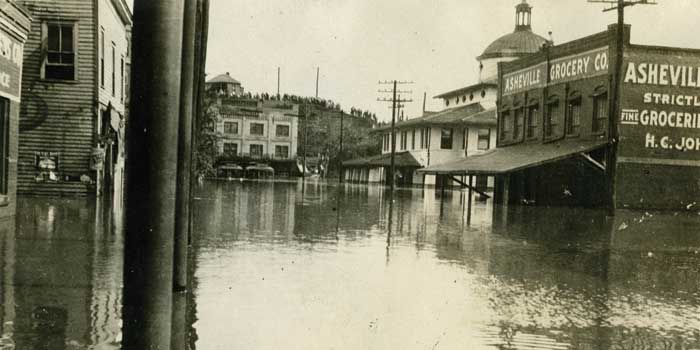A century ago, western North Carolina experienced possibly the worst natural disaster the region has ever seen. July 15, 1916 was a day of extraordinary rain; one location along the Blue Ridge Parkway received 22 inches of rain in a 24-hour period. The mountains, historically a protector against weather extremes, prevented headwaters from spreading out to be absorbed into the high forests. A dozen regional rivers raged down their channels, over their banks, and ravaged downstream communities. The French Broad and the Swannanoa, swollen to unheard-of heights, devastated Hendersonville, Asheville, Biltmore, Marshall and many other communities lying in their watersheds.
 |
| Asheville's Depot Street in the Flood of 1916. The train station is on the right, back. |
What was the Great Flood of 1916
like, and what were its short-term and long-term impacts on Asheville and the
surrounding area? What lessons in emergency management did we learn in
the hundred years between 1916 and 2016? And are we prepared for the next
floods that are sure to visit the French Broad River?
Please join us this July 15th and
16th for a symposium at Ferguson Auditorium on the AB Tech campus as we explore
answers to these questions. Several local organizations - Buncombe County
Emergency Management, the North Carolina Department of Natural and Cultural
Resources, RiverLink, Duke Power, the Western North Carolina Historical
Association, the United States Geological Survey and the Wilma Dykeman Legacy -
have come together to produce two days of innovative programming that promise
to be both entertaining and informative. The 2-day symposium is free to
the public, so mark your calendars! Attendees will be able to purchase a
copy of "So Great the Devastation," a 48-page heavily illustrated
4-color booklet about the Great Flood.
On Friday, July 15, a series of
three panels will discuss the Great Flood of 1916 and its local impacts;
emergency management lessons we have learned in the hundred years between 1916
and 2016; and the state of our preparedness for future floods.
Friday's schedule is as follows:
- 8:00 AM: Welcome and Registration
- 8:30 - 10:00: Panel describing the Great Flood of 1916 in the French Broad watershed
- Illustrated talk on the flood's causes and devastation, presented by Milton Ready, Professor Emeritus of History at UNC Asheville
- Preview of "River of Sorrow, Land of the Sky: The Asheville Flood of 1916," a study of the flood's impact on an industrializing city that altered the socio-economic priorities of the area with long-lasting ramifications, presented by Anthony Sadler, graduate student in environmental history at Appalachian State University.
- 10:00 AM: Morning break
- 10:15 - 11:45: Panel discussing lessons emergency managers have learned, 1916 - 2016
- Jim Fox, Director of UNC Asheville's National Environmental Modeling and Analysis Center
- Chris Crew, State Hazard Mitigation Officer, NC Division of Emergency Management
- John Gerber, State National Floodplain Insurance Program Coordinator, NC Department of Public Safety
- 11:45 AM: Lunch
- 1:30 - 3:00: Panel addressing the question, "Are we prepared for the next flood?" from the standpoints of:
- Cynthia Barcklow, Buncombe County Planning and Development
- Asheville (McCray Coates, Stormwater Services Manager, City of Asheville)
- River Arts District (Stephanie Monson Dahl, Riverfront Redevelopment Office Director, City of Asheville)
- Architecture (Robert Griffin, President of Griffin Architects)
On Saturday, May 16, the centennial of the Great Flood of 1916 and
its effects throughout western North Carolina will be commemorated by a variety
of presentations, including a documentary, flood stories, and music of the period.
Saturday's schedule is as follows:
- 10:00 AM: Keynote speech by
John Barry, author of Rising Tide: The Great Mississippi Flood
of 1927 and How It Changed America - 11:15 AM: "A Climatological Perspective on the 1916 Flood" by Michael Tanner, Director of Asheville's NOAA Center for Weather and Climate
- Noon: Lunch
- 1:15 PM: Dedication of new historical marker, with stringband music from the period
- 1:30 PM: "Come Hell or High Water," a documentary of the Great Flood of 1916 by David Weintraub, filmmaker, Hendersonville
- 1:45 PM: "Granny and the Flood," Bill Carson, storyteller and owner of the Orchard at Altapass
- 2:00 PM: Damage to Assets
- Bill Alexander, Landscape and Forest Historian, Biltmore Company
- Steve Jester, Water Strategy Hydro Licensing & Lake Services, Duke Energy
- Gary Freeze, Professor of History, Catawba College
|
|

No comments:
Post a Comment